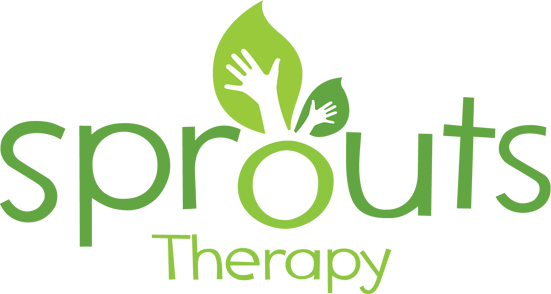Pediatric Physical Therapy

Gross Motor Play is crucial for children's growth, development and independence.
Gross motor (physical) skills are those which require whole body movement and which involve the large (core stabilizing) muscles of the body to perform everyday functions such as walking, jumping, running, playground skills (e.g. climbing), sporting skills (e.g. catching, throwing, hitting and kicking a ball), riding a bike, dressing skills and sitting upright at a table. The goal of pediatric physical therapy is to assist each child in reaching their maximum potential to function independently and to promote active participation in home, school, and community environments.
Physical Therapy at Sprouts Therapy
At Sprouts Therapy, the therapist and your child interact in a sensory-rich environment that is chalk full of play equipment to encourage swinging, spinning, riding, jumping, sliding, and climbing. The environment is created to feel like a giant playground for your child. Sessions are structured so your child is challenged but successful in completing each activity. From increasing strength, balance, and coordination to fostering the brain’s development of neural pathways, our therapists monitor and direct the child’s “play” in order to ensure that the client’s therapy goal is always the focus.
Children who benefit from Physical Therapy
Children who are challenged in reaching their developmental milestones in gross motor skills (Rolling, sitting, standing, walking) or have difficulties with functional mobility may benefit from Pediatric Physical Therapy.
Common Conditions We Support
- Torticollis
- Toe Walking
- Gross Motor delay (balance, coordination, strength, foundational movement, ball skills)
- Cerebral Palsy
- Developmental Coordination Disorder
- Developmental Delays
- Down Syndrome
- Autism Spectrum Disorders
- Genetic Disorders
- Infant Developmental Motor Delays
- Muscle Weakness
- Hypo/Hypertonia
- Scoliosis
Treatment May Include
- Gross Motor Strengthening/Endurance
- Infant Positioning
- Neuromuscular Reeducation
- Gait training
- Therapeutic exercise
- Balance and coordination training
- Manual therapy
- Alignment and postural training
- Hippotherapy/Equine Movement
- Development and monitoring of personalized home exercise program
- Parent/Caregiver Education
Does my child need physical therapy?
If any of these describes a characteristic of your child or you are concerned about one or more symptoms, then a physical therapy evaluation might be appropriate:
- Having trouble throwing, catching, or kicking balls
- Falling more often than their peers
- Getting tired more quickly than their peers
- Having trouble with running, jumping, or climbing on the playground
- Seeming clumsy or uncoordinated compared to their peers
- Having a lack of interest in physical activity, sports, and playing on the playground
- Poor safety awareness
- For infants – having difficulty lifting or turning head
For more help in determining what skills are appropriate for what age, view these developmental milestones for ages two months to five years.
The Evaluation Process
Initial evaluations are necessary to determine whether your child qualifies for therapy services and to create a specialized therapy program if services are needed.
What to Bring
Please bring prescription glasses, hearing aids, durable medical equipment, or AAC devices your child may use (if applicable).
Assessment Details
Your child’s PT Evaluation will include a 1.5 hour evaluation/parent consultation. Evaluations typically consist of standardized testing, observations in a clinical setting, and parent-report measures. Because all children are different, your evaluating therapist will determine appropriate testing methods based on your child’s needs. A pediatric PT evaluation may include assessment of: Gross motor skills, range of motion, strength, endurance, balance - static and dynamic, motor coordination, object manipulation, and pain management.
The Report
You will receive a detailed evaluation report and plan of care. You will receive the evaluation report in our HIPAA compliant software system (Therabill), within your personal client portal approximately four weeks after the assessment. If you have any questions after reviewing the evaluation report, we can set up a complimentary phone consultation with you and the evaluating therapist.
(If your child already has a recent evaluation from another facility, we may be able to use that evaluation to prepare a plan of care and begin treatment.)
The Scheduling Process
If the evaluating therapist has determined your child would benefit from therapy treatment, you may begin scheduling sessions immediately after the evaluation, while waiting for the full report. If there are no ongoing appointments available during your availability window, your child will be added to the waitlist. We may email you one-time openings, as available. These are offered on a first-come, first-serve basis until an ongoing session becomes available for your child.
Physical Therapy is offered through teletherapy, in-clinic or a combination of both.
For clients attending Sprouts at a recommended frequency of one session per week, your child will typically see the same therapist on the same day at the same time. If a child receives multiple weekly treatments, they may be scheduled with a different therapist on different days of the week. Each of your child's therapists are able to view daily notes from previous sessions. When multiple therapists observe your child demonstrating a new skill, it ensures the child is progressing in skill generalization.
New client?
All Rights Reserved | Site by Fix8 Media

